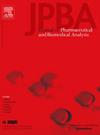Analyte and probe melting temperature guided method development strategy for hybridization LC-MS/MS quantification of siRNAs
IF 3.1
3区 医学
Q2 CHEMISTRY, ANALYTICAL
Journal of pharmaceutical and biomedical analysis
Pub Date : 2024-11-01
DOI:10.1016/j.jpba.2024.116556
引用次数: 0
Abstract
Small interfering RNA (siRNA) is a novel class of double-stranded oligonucleotide therapeutics rapidly growing in drug research and development. Accurate, sensitive, and reliable quantification of siRNA analytes in biological samples is required to study their pharmacokinetics, toxicokinetics, and biodistribution. Hybridization LC-MS/MS can achieve highly sensitive and specific bioanalysis of single-stranded oligonucleotides, e.g., antisense oligonucleotides (ASOs); however, its application for bioanalysis of siRNA or other double-stranded oligonucleotides is limited. The detailed rationale and principles for assay development are still not well understood. In this work, we systematically evaluated key steps and parameters of hybridization LC-MS/MS assays, including probes (five different types compared), hybridization procedure and temperature, elution temperature, and column temperature using patisiran, an approved siRNA drug, as the test siRNA. Based on the evaluation, a practical and efficient melting temperature (Tm) guided strategy was developed for fast and reliable method development of hybridization LC-MS/MS assays for siRNA bioanalysis. The strategy was successfully applied to siRNA-A, a test siRNA, in mouse plasma over the range of 1.00–1000 ng/mL and the resulting method has been used to support multiple mouse studies. This method-development strategy showed great value as a general approach for other siRNAs or double-stranded oligonucleotides.
分析物和探针熔化温度引导的 siRNA 杂交 LC-MS/MS 定量方法开发策略
小干扰 RNA(siRNA)是一类新型的双链寡核苷酸疗法,在药物研究和开发领域发展迅速。要研究 siRNA 的药代动力学、毒代动力学和生物分布,就必须对生物样本中的 siRNA 分析物进行准确、灵敏和可靠的定量。杂交 LC-MS/MS 可以对单链寡核苷酸(如反义寡核苷酸 (ASO))进行高灵敏度和特异性的生物分析,但在 siRNA 或其他双链寡核苷酸的生物分析中应用有限。人们对检测开发的详细原理和原则仍不甚了解。在这项工作中,我们系统地评估了杂交 LC-MS/MS 检测的关键步骤和参数,包括探针(比较了五种不同类型的探针)、杂交程序和温度、洗脱温度和色谱柱温度。在评估的基础上,开发了一种实用、高效的熔融温度(Tm)指导策略,用于快速、可靠地开发 siRNA 生物分析的杂交 LC-MS/MS 方法。该策略成功地应用于小鼠血浆中1.00-1000纳克/毫升范围内的 siRNA-A(一种测试 siRNA),所得到的方法已用于支持多项小鼠研究。这种方法开发策略作为一种通用方法,对其他 siRNA 或双链寡核苷酸具有重要价值。
本文章由计算机程序翻译,如有差异,请以英文原文为准。
求助全文
约1分钟内获得全文
求助全文
来源期刊
CiteScore
6.70
自引率
5.90%
发文量
588
审稿时长
37 days
期刊介绍:
This journal is an international medium directed towards the needs of academic, clinical, government and industrial analysis by publishing original research reports and critical reviews on pharmaceutical and biomedical analysis. It covers the interdisciplinary aspects of analysis in the pharmaceutical, biomedical and clinical sciences, including developments in analytical methodology, instrumentation, computation and interpretation. Submissions on novel applications focusing on drug purity and stability studies, pharmacokinetics, therapeutic monitoring, metabolic profiling; drug-related aspects of analytical biochemistry and forensic toxicology; quality assurance in the pharmaceutical industry are also welcome.
Studies from areas of well established and poorly selective methods, such as UV-VIS spectrophotometry (including derivative and multi-wavelength measurements), basic electroanalytical (potentiometric, polarographic and voltammetric) methods, fluorimetry, flow-injection analysis, etc. are accepted for publication in exceptional cases only, if a unique and substantial advantage over presently known systems is demonstrated. The same applies to the assay of simple drug formulations by any kind of methods and the determination of drugs in biological samples based merely on spiked samples. Drug purity/stability studies should contain information on the structure elucidation of the impurities/degradants.

 求助内容:
求助内容: 应助结果提醒方式:
应助结果提醒方式:


